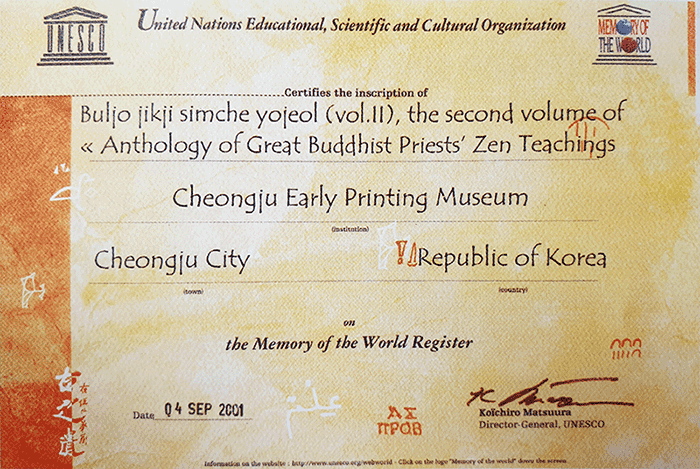UNESCO/Jikji Memory of the World Prize
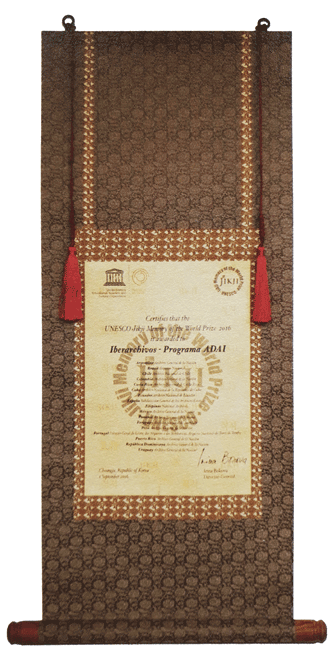
UNESCO/Jikji Memory of the World Prize
Established by UNESCO in 2004, the purpose of the UNESCO/Jikji Prize is to reward efforts contributing to the preservation of the world’s documentary heritage. The title of the prize comes from Jikji simche yojeol, the oldest extant movable metal type book in the world.
Meaning of the Prize
Following the inscription of Jikji on the MoW Register in 2001, the UNESCO/Jikji Prize was established in April 2004, further strengthening its global status. As it is the first prize in the world to honor documentary heritage and the only prize established by a local city government, it will also raise the profile of the city of Cheongju.
Background of the Prize
The establishment of the prize was promoted to introduce the world to the precious values of Jikji, the oldest extant movable metal type book, namely its creative value as the invention of metal type, its historical value, its value as a means of sharing and spreading knowledge and information, and its artistic and cultural value. In addition, the establishment of the prize will herald the outstanding achievements of the Korean people to the world and highlight the potential of Korea and Cheongju to serve as global hubs of knowledge, information, and culture.
Establishment Process
- April 2002A meeting was held with the Ministry of Foreign Affairs and the Korean Committee of UNESCO to discuss on the establishment of the Jikji Prize
- February 2003A plan was submitted for the Jikji Prize (Cheongju City → Ministry of Foreign Affairs), requested the implementation of the plan after announcing a Jikji Prize ordinance
- March 2003Submitted the proposal for the Jikji Prize (Cheongju City Council → Ministry of Foreign Affairs)
- May 2003 Cheongju City established the Jikji Prize ordinance.
- September 2003 Cheongju City promulgated the Jikji Prize ordinance.
- September 2003 The Ministry of Foreign Affairs proposed the establishment of the Jikji Prize to UNESCO Headquarters as an agenda item to be discussed for the 167th Executive Committee of UNESCO.
- April 28, 2004The establishment of the Jikji Prize was approved by UNESCO headquarters in France, following evaluation and deliberation by the 169th Executive Committee of UNESCO
- June to August 2004 Consulted with UNESCO headquarters on awarding the Jikji Prize
- September to November 2004Reflected prize money and additional expenses in 2005 budget
- June to August 2005The winner of the Jikji Prize was selected by UNESCO headquarters
- September 2005Held the first Jikji Prize Ceremony (Jikji Day/Jikji Festival)
Eligibility and Award Ceremony
- Individuals or groups that have made significant contributions to the preservation and accessibility of documentary heritage of humanity are eligible for candidature. The prize has been awarded biennially since 2005 on Jikji Day in Cheongju City, with a cash prize of $30,000.
- The venue for the award ceremony is decided in consultation with UNESCO headquarters. The first Jikji Prize ceremony was held in Cheongju City.
Laureates of the Prize
10th Jikji Prize Laureate (2024) : National Library of the Republic of Indonesia
Established in 1980, the National Library of the Republic of Indonesia has been instrumental in preserving the ancient and diverse manuscript traditions of Indonesia. The library operates extensive programs that encompass various regions, languages, and cultures, organizing festivals, publications, and educational initiatives for children and youth. It has taken a proactive role in the collection and conservation of manuscripts, setting a global example by improving access to these invaluable resources. Furthermore, the library has shown a strong commitment to increasing public awareness of documentary heritage through innovative projects and publications.
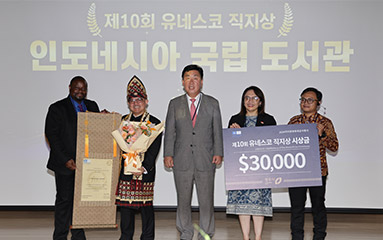
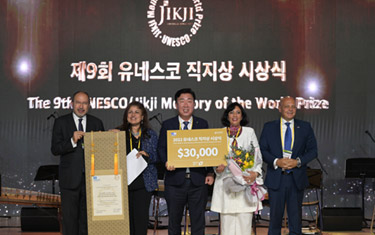
9th Jikji Prize Laureate (2022) : Libraries and Learning Technologies (LLT), American University in Cairo, Egypt
Founded in 1919, AUC’s LLT operates the Rare Books and Special Collections Library (RBSCL), which has been active in collecting and preserving diverse documentary heritage properties and artifacts, including Egyptian architectural items and a vast collection of records related to Egyptian society, the history of women, and art & culture. By serving as a research hub for the pan-Arab region in the said fields, the RBSCL has helped enhance global accessibility to the library’s documentary heritage collection while contributing to the local community through activities aimed at raising awareness on the importance of preserving documentary heritage.
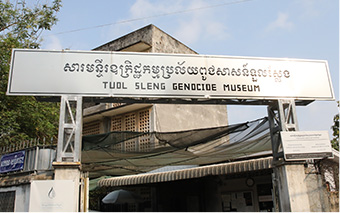
8th Jikji Prize Laureate (2020) : Tuol Sleng Genocide Museum of Cambodia
Established in 1979, the Tuol Sleng Genocide Museum was a former high school which was used as an interrogation and detention center during the Khmer Rouge regime. Its archives contain photographs of prisoners, confessions extracted under torture, and other biographical records that vividly illustrate the cruelty of this tragic period. For its global importance and historical value, these archives were inscribed on the UNESCO Memory of the World Register in 2009. In 2018, the museum successfully preserved some 750,000 documents and digitized almost 500,000 records. By preserving and transmitting these records, it is contributing to raising public awareness on human rights and peace, especially for the future generations.
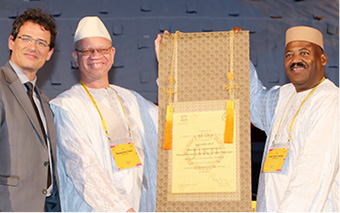
The 7th Laureate (2018) : SAVAMA-DCI, a Malian non-governmental organization
Founded in 1996, SAVAMA-DCI is an African NGO engaged in the preservation of Islamic documents. The prize was awarded in the recognition of its efforts to protect and preserve ancient documents in northern Mali in Africa in response to the region’s occupation by al-Qaeda-related militias who posed the threat of destruction against historical sites and manuscripts. The organization, for example, digitalized some 600 documents kept at Al Wangari Library in Mali.
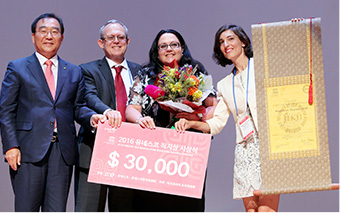
The 6th Laureate (2016) : Iberarchivos ADAI Programme
Iberarchivos was established in 1999 to promote access, conservation, and dissemination of the documentary heritage of Latin America. The programme has since conducted archive management training courses for Spanish- and Portuguese-speaking countries and cooperation projects in the relevant region. Iberarchivos works with archives from 15 countries including Argentina, Brazil, Chile, Colombia, Costa Rica, and Spain.
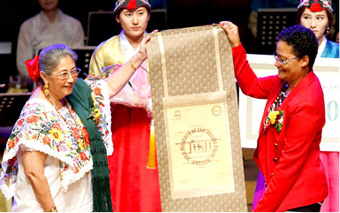
The 5th Laureate (2013) : ADABI of Mexico
Founded in 2003, ADABI of Mexico has contributed to the preservation and digitization of old documents, and actively supported various organizations to develop archives, thereby raising awareness of the public on the importance of documentary heritage.
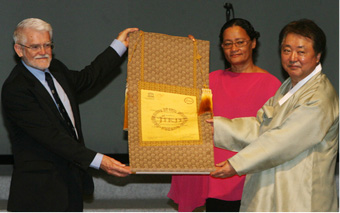
The 4th Laureate (2011) : National Archive of Australia
Founded in 1960 as a subsidiary of the Australian government, the National Archive of Australia is a world leader in the field of archives, most notably digital preservation. It shares its professional knowhow with the global preservation community and the public through extensive publications.
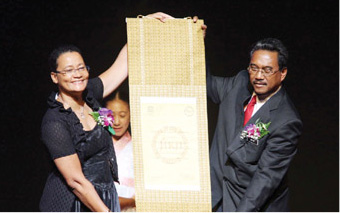
The 3rd Laureate (2009) : National Archive of Malaysia
Since 1875, the National Archives of Malaysia has collected, organized, and preserved the records of the State Secretary of Selangor, and contributed to the preservation and restoration of documents from natural disasters such as floods and fires. It also contributed to educational and training programs for documentary heritage preservation across Asia by collecting and maintaining the original forms of civil records such as letters, diaries, and photographs.
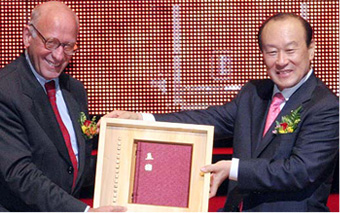
The 2nd Laureate (2007) : Austrian Audiovisual Research Archive
Founded in 1899, the Austrian Audiovisual Research Archive is the oldest institution of its kind and houses 65,000 audio and video records, including language, music, and oral records encompassing Africa as well as Austria. It has contributed greatly to the development of audio data storage technology by, for example, introducing a method for extracting and storing audio data only.
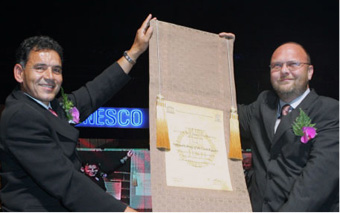
The 1st Laureate (2005) : National Library of the Czech Republic
Established in 1360, the National Library of the Czech Republic has more than 6 million books in its collection, which represent great value not only for understanding the culture of Czechia but also many other cultures around the world. The library has contributed greatly to the preservation of documentary heritage by, for example, converting acidified paper books and documents into CDs for safe storage and easy access by the public.
